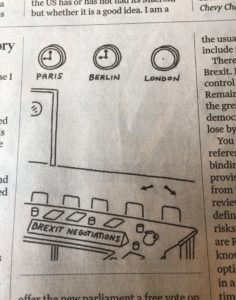Mark Lilla sums it up:
“So it should come as little surprise that the term liberalism leaves so many Americans indifferent today. It is considered, with some justice, as a creed professed mainly by educated urban elites cut off from the rest of the country who see the issues of the day principally through the lens of identities, and whose efforts centre on the care and feeling of hyper-sensitive movements that dissipate rather than focus on the energies of what remains of the left. Contrary to what the centrist coroners of the 2016 election will be saying, the reason the Democrats are losing ground is not that they have drifted too far to the left. Nor, as the progressives are insisting, is it that they have drifted too far to the right, especially on economic issues. They are losing because they have retreated into caves they have carved for themselves in the side of what was once a great mountain.”
From The Once and Future Liberal: After Identity Politics, page 10.
See also Lilla’s acerbic NYT OpEd piece after the election, which began:
“It is a truism that America has become a more diverse country. It is also a beautiful thing to watch. Visitors from other countries, particularly those having trouble incorporating different ethnic groups and faiths, are amazed that we manage to pull it off. Not perfectly, of course, but certainly better than any European or Asian nation today. It’s an extraordinary success story.
But how should this diversity shape our politics? The standard liberal answer for nearly a generation now has been that we should become aware of and “celebrate” our differences. Which is a splendid principle of moral pedagogy — but disastrous as a foundation for democratic politics in our ideological age. In recent years American liberalism has slipped into a kind of moral panic about racial, gender and sexual identity that has distorted liberalism’s message and prevented it from becoming a unifying force capable of governing.”

